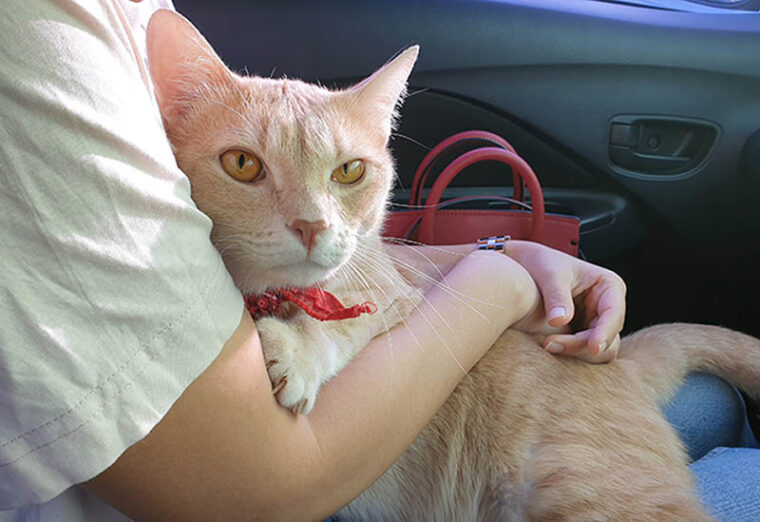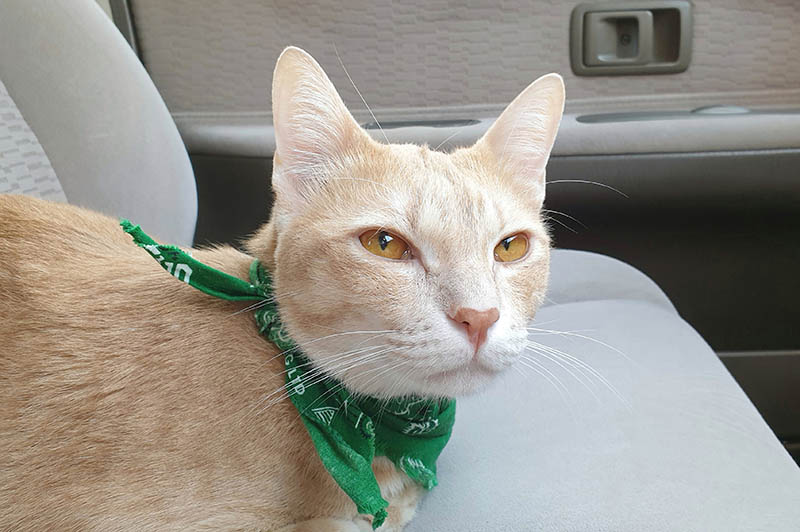
If you’ve ever been stuck in the back seat of a minivan winding its way through a mountain road nicknamed the “Tail of the Dragon,” you’re probably familiar with the discomfort of motion sickness.1 Your cat likely won’t experience that exact (very specific) scenario, but it can undoubtedly suffer from car sickness.
Motion sickness can be messy and unpleasant for both you and your cat. In this article, we’ll take an in-depth look at this condition, including common signs and how you can help prevent motion sickness in your cat.
What Is Motion Sickness?
Motion sickness is a condition that causes nausea and upset stomach in a cat traveling in a vehicle. Typically, cats suffer motion sickness in the car, but it can also occur when riding in a boat or flying on an airplane. Dogs can also get car sick, but it’s less common because they’re more likely to spend time traveling than a cat. Most cats only get in the car to go to the vet, which is already a stressful situation in their mind.

What Are the Signs of Motion Sickness?
A cat experiencing motion sickness will display various signs of an upset and unsettled stomach. Some of these include:
Your cat may experience one or more of these signs of motion sickness. Cats typically do an excellent job hiding how they feel as a survival instinct. Because of this, it can be challenging to determine if your cat is car sick if they only display subtle signs.
What Are the Causes of Motion Sickness?
Motion sickness typically results from a cat’s stress and anxiety over riding in the car. As we mentioned earlier, cats generally don’t spend much time in the car, and when they do, it’s almost always because they’re going to the vet. Because the vet is also stressful, the cat may experience an emotional response as soon as they get into the car.
It might not be the car itself causing your cat to feel ill but the anticipation of the stressful experience. Cats that had a bad experience at the vet as kittens may remember the event as soon as they get into the car, sparking motion sickness.
Cats can also be stressed by their crate or simply by leaving the familiar confines of their house. Eventually, motion sickness can be a conditioned reaction, meaning the cat will associate being in the car with getting an upset stomach.
How Do I Care for a Cat with Motion Sickness?
To help prevent your cat from experiencing motion sickness, you’ll need to work on desensitizing them to riding in the car. This gradual process starts with getting your cat comfortable with their carrier. If they never see the carrier unless they’re going in the car to the vet, it is likely another trigger for motion sickness.
Try leaving the carrier with the door open instead of storing it in a closet. Place comfortable bedding inside and place it near your cat’s favorite nap spot to encourage them to use it. You could also try feeding your cat inside the carrier.
Once your cat is no longer worried about the carrier, it’s time to move on to the car. Bring your cat out to the car in the carrier. Start the car but don’t drive anywhere; just let your cat hang out with the car not moving. Monitor your cat’s reaction to determine if you can move on to the next step.
If your cat seems calm, try leaving the driveway or parking spot the next day and coming right back. Once your cat can handle that, gradually increase the length of your drive until your kitty can comfortably spend the entire trip to the vet (or longer) without getting car sick.
It’s also helpful for your cat to take car rides that don’t end at the vet. This strategy helps break the conditioning that getting in the car always means going to the vet, which can lead to motion sickness. Praise and reward your cat every time you return home to help them form positive associations with riding in the car.
If your cat seems stressed during any step of this process, call it quits for the day and return to the previous desensitization phase. Moving too quickly can make your cat more anxious and the car sickness worse. It may take days or weeks to cure your cat’s motion sickness.

Frequently Asked Questions (FAQs)
How Can I Make the Car Ride More Relaxing for My Cat?
Help your cat feel comforted in their carrier by bringing along an item that smells like home. Remember, many cats get motion sick because they’re so anxious about leaving the familiarity of home. You could also try spraying a cat pheromone spray in the car or carrier.
What Are Some Other Strategies to Prevent Motion Sickness?
If you know your cat will be riding in the car, don’t feed them for at least 4–6 hours before the trip. Your cat may feel less nauseous with an empty stomach, and you’ll have less mess to clean up if they do end up vomiting.
Another option is to cover your cat’s carrier with a blanket and leave the front side exposed. This forces your cat only to look out the front of the carrier, which can reduce motion sickness. Humans use a similar strategy when looking out the car’s windshield instead of the side windows to decrease motion sickness.
Keep the temperature in the car cool and play soothing music. Try cracking some windows to improve airflow. Make sure you stay calm, so your cat doesn’t become more anxious by sensing your mood.
Are There Any Medications That Can Help with Motion Sickness?
If your cat still gets motion sickness despite your best efforts, try talking to your vet about medications that might help. Anti-nausea medications are one possibility, as well as anti-anxiety drugs. Cats that get scared or aggressive at the vet may benefit from these relaxing pharmaceuticals.
Don’t wait until the last minute to ask your vet for a prescription. Some anxiety medications require several doses or even longer to work effectively. Never give your cat more than the prescribed dose without speaking to your vet first.
Summary
If you’re tired of cleaning vomit out of your cat’s carrier every time they go to the vet, we hope this article has helped you understand what causes motion sickness and how you can help. Car sickness is a common ailment for cats, but that doesn’t mean you have to accept it as inevitable.
Look no further than the “adventurous cats” joining their owners on exciting outdoor excursions to be inspired that your kitty can overcome motion sickness and learn to tolerate the car.
Featured Image Credit: RJ22, Shutterstock







